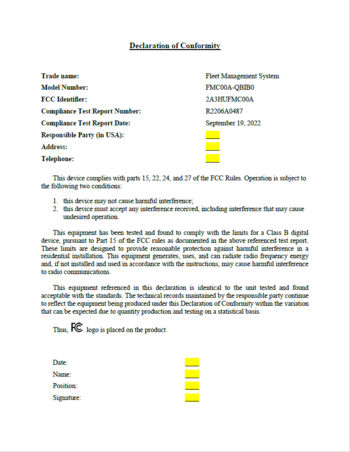FMC00A-QBIB0 FCC

The FCC Declaration of Conformity or the FCC label or the FCC mark is a certification mark employed on electronic products manufactured or sold in the United States which certifies that the electromagnetic interference from the device is under limits approved by the Federal Communications Commission.
FCC label
The FCC label is found even on products sold outside the US territory, because they are either products manufactured in the US and had been exported, or they are sold in the US. This makes the FCC label recognizable worldwide even to people to whom the name of the agency Federal Communications Commission is not familiar.
The Federal Communications Commission established the regulations on electromagnetic interference under Part 15 of the FCC rules in 1975. After several amendments over the years, these regulations were reconstituted as the Declaration of Conformity and Certification procedures in 1998.
FCC Approvals
- This device complies with part 15 of the FCC Rules. Operation is subject to the following two conditions: (1) This device may not cause harmful interference, and (2) this device must accept any interference received, including interference that may cause undesired operation.
- This equipment has been tested and found to comply with the limits for a Class B digital device, pursuant part 15 of the FCC Rules. These limits are designed to provide reasonable protection against harmful interference in a residential installation. This equipment generates, uses and can radiate radio frequency energy and, if not installed and used in accordance with the instructions, may cause harmful interference to radio communications. However, there is no guarantee that interference will not occur in a particular installation. If this equipment does cause harmful interference to radio or television reception, which can be determined by turning the equipment off and on, the user is encouraged to try to correct the interference by one or more of the following measures:
- Reorient or relocate the receiving antenna.
- Increase the separation between the equipment and receiver
- Connect the equipment into an outlet on a circuit different from that to which the receiver is connected.
- Consult the dealer or an experienced radio/ TV technician for help.
- Changes or modifications not expressly approved by the manufacturer could void the user’s authority to operate the equipment.
- This equipment complies with FCC radiation exposure limits set forth for a uncontrolled environment. To comply with FCC RF Exposure compliance requirements, this grant is applicable to only Mobile Configurations. The antennas used for the transmitter must be installed to provide a separation distance of at least 20cm from all persons and must not be co-located or operating in conjunction with any other antenna or transmitter.
FCC Approval Procedure
As specified in official: FCC website, there are three main ways of authorizing the equipment:
- Certification process
- Declaration of Conformity
- Both procedures
FMC00A FCC Supplier’s Declaration of Conformity (SDoC)
For FMC00A FCC compliance SDoC procedure is mandatory. That requires the party responsible for compliance ensure that the equipment complies with the appropriate technical standards. The responsible party, who must be located in the Unites States, is not required to file an equipment authorization application with the Commission or a TCB. Equipment authorized under the SDoC procedure is not listed in a Commission database. However, the responsible party or any other party marketing the equipment must provide a test report and other information demonstrating compliance with the rules upon request by the commission. The responsible party has the option to use the certification procedure in place of the SDoC procedure.
Official Federal Communications Commission for SDoC compliance requires and mandates two major parties:
- Manufacturer (Teltonika) to test the device for all applicable standards;
- Local US entity (Importer or Marketer) to sign Supplier’s Declaration of Conformity.
The FMC00A conformity with the essential requirements has been demonstrated against the following harmonized standards:
| FCC Standard | Test report No. |
|---|---|
| R2206A0487-E1V1 | |
| R2206A0487-E1V1 | |
| R2206A0487-M1 | |
| R2206A0487-R1V1 | |
| FCC CFR47 Part 2 (2023)/ FCC CFR47 Part 27C (2023 | R2206A0487-R1V1 |
| FCC CFR47 Part 2 (2023)/ FCC CFR 47 Part 22H (2023) | R2206A0487-R2V1 |
| FCC CFR47 Part 2 (2023)/ FCC CFR 47 Part 24E (2023) | R2206A0487-R2V1 |
| FCC CFR47 Part 2 (2023)/ FCC CFR47 Part 27C (2023) | R2206A0487-R3V1 |
| FCC CFR47 Part 15C (2023) | R2206A0487-R3V1 |
| FCC CFR47 Part 15C (2023) | R2206A0487-R4 |
To be in compliance with FCC
We, Teltonika, have fulfilled our duty of testing the device for all the required standards by FCC.
Only Importer or Marketer, local US entity, can sign Supplier’s Declaration of Conformity, therefore please find SDoC below and sign by your own entity’s name.
 |
To download a PDF version of the declaration, click here.
To download a WORD version of the declaration, click here.
Disclaimer:
Test reports that are referenced in declarations and certificates can be provided upon request. For the request to be approved, the recipient of the test reports should be a certification authority or certified test house. The recipients will be asked to sign a non-disclosure agreement (NDA).
External links
https://www.fcc.gov/
https://www.fcc.gov/engineering-technology/laboratory-division/general/equipment-authorization
